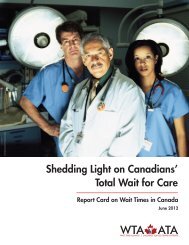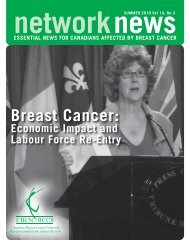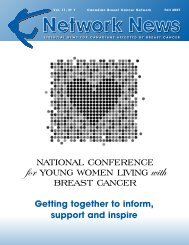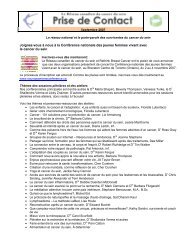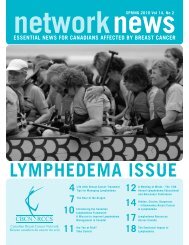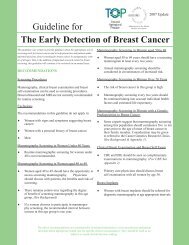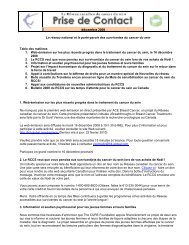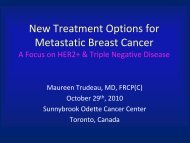Network News - Winter/Spring 2010 - Canadian Breast Cancer ...
Network News - Winter/Spring 2010 - Canadian Breast Cancer ...
Network News - Winter/Spring 2010 - Canadian Breast Cancer ...
You also want an ePaper? Increase the reach of your titles
YUMPU automatically turns print PDFs into web optimized ePapers that Google loves.
having surgery but is not currently ill.<br />
It is important to let children know<br />
that she will be okay when she returns<br />
from the hospital. The post-surgical<br />
recovery period requires discussions<br />
and changes in roles and routines at<br />
home and in some cases women will<br />
not be able to carry or hold young<br />
children or perform many physical<br />
tasks. These changes require some<br />
explanation to the child in an ageappropriate<br />
manner while minimizing<br />
the potential for the child to become<br />
fearful. The use of toys, dolls, and<br />
open discussions and preparation<br />
before surgery can assist the child<br />
to adjust to the changes that occur<br />
following surgery and to provide some<br />
understanding around the situation<br />
while minimizing alarm.<br />
These are just a few of the most<br />
common reactions and issues that are a<br />
part of the genetic testing process and<br />
its implications. Adjustment is just a<br />
normal part of the process. Reactions<br />
can vary but most individuals do<br />
adjust over time and they are able<br />
to work through these challenges on<br />
their own or with friends and family<br />
support. Approximately 10-20% of<br />
individuals require more emotional<br />
support and assistance in working<br />
through adjustment issues and<br />
coping with the associated stressors,<br />
like having surgery, or the reactions<br />
that can occur around a genetic test<br />
result. Individuals may benefit from<br />
talking openly with their healthcare<br />
professionals or with their own<br />
families and peer supports as they<br />
learn to cope with their test results and<br />
during the periods when they must<br />
weigh personal options.<br />
Strategies that can help individuals<br />
to gain clarity and cope with and<br />
work through these challenges are<br />
also useful and can be found through<br />
Internet searchers or through genetic<br />
testing centres and cancer clinics.<br />
Observing the challenges that occur as<br />
a result of genetic testing as stressful<br />
and requiring an adjustment period<br />
allows the individual to regard these<br />
reactions as a normal part of the<br />
process. Hopefully, such a context will<br />
help individuals to ask for help more<br />
often, seek out strategies and minimize<br />
the opportunity for more distress that<br />
can affect one’s quality of life.<br />
Services and supportive tools that<br />
can be helpful:<br />
• Websites<br />
• Chat lines; links to meet others in<br />
similar situations<br />
• Support groups, especially<br />
those that address relevant<br />
areas of concern, either peer or<br />
professionally-led<br />
• Decisional aids or tools to assist<br />
with medical decision-making (ask<br />
your genetic counsellor or support<br />
team at your local cancer centre or<br />
hospital)<br />
• One-on-one counselling with a<br />
nurse, mental health professional,<br />
genetic counsellor, or family doctor<br />
• Meditation techniques<br />
• Stress management strategies (yoga,<br />
exercise, guided imagery)<br />
• Reading materials (Internet based,<br />
CD ROMs, books, self-help books,<br />
pamphlets)<br />
You should consider seeking<br />
professional assistance when<br />
you have:<br />
• Difficulty sleeping<br />
• Strong emotional reactions<br />
(e.g. grief, sadness, anxiety,<br />
crying episodes that last more<br />
than a couple of weeks, feeling<br />
overwhelmed)<br />
• Anger outbursts<br />
• Difficulty concentrating<br />
• Difficulty carrying out roles at<br />
home or work<br />
• Extreme feelings of “being alone”<br />
• Withdrawal from hobbies, work,<br />
friendships<br />
• Lack of clarity around a decision,<br />
ambivalence in considering options,<br />
unable to make a decision<br />
• Uncertainty about how to discuss<br />
genetic information with offspring<br />
or other family members<br />
• Challenges when communicating to<br />
family members<br />
• Difficulties accepting changes in<br />
body image or dealing with the<br />
impact of surgery •<br />
Dr. Mary Jane Esplen is a Clinician-<br />
Scientist at the University Health<br />
<strong>Network</strong>, a Professor at the Department<br />
of Psychiatry, Faculty of Medicine,<br />
University of Toronto, and is the<br />
Inaugural Director of the de Souza<br />
Institute. She is also a <strong>Canadian</strong> Institute<br />
of Health Research scientist studying the<br />
psychosocial impact of genetic testing<br />
as well as having cancer. Dr. Esplen<br />
received a Ph.D. in psychosomatic<br />
medicine from the Institute of Medical<br />
Sciences, University of Toronto, and<br />
completed a post-doctorate fellowship in<br />
cancer genetics at the Samuel Lunenfeld<br />
Research Institute in Toronto. She is<br />
a therapist and researcher working in<br />
psychosocial oncology and teaches at the<br />
University of Toronto. She has a strong<br />
interest in developing measurement tools<br />
and interventions for cancer genetic<br />
populations and individuals with cancer.<br />
Dr. Esplen is the recent past president of<br />
the <strong>Canadian</strong> Association of Psychosocial<br />
Oncology.<br />
<strong>Network</strong> <strong>News</strong> <strong>Winter</strong>/<strong>Spring</strong> <strong>2010</strong> 25



